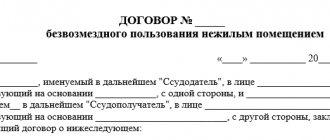The party to the transaction files a claim to recognize the contract as not concluded in order to avoid legal consequences. Such a claim may become the main argument that the defendant uses in another case as an objection or counterclaim. Recognizing the contract as not concluded means the absence of an obligation between the parties. But at the same time, the plaintiff must consider the likelihood of bringing a claim for unjust enrichment.
An interested person should begin preparing a claim by carefully studying the legal norms related to a specific contract. It would also be a good idea to consult a lawyer in the field of contract law. He will help you file your claim correctly. When preparing on your own, you can use the example provided on the site.
:
Statement of claim for recognition of the contract as not concluded
Invalid contract
NB: In order to preserve the terminology used in legislation, the term “transaction” will be used in some places. Let us recall that “transaction” is a broader concept than “agreement”, and therefore the grounds for invalidating a transaction equally apply to the contract. Art. 431.1 of the Civil Code of the Russian Federation: “The provisions of this Code on the invalidity of transactions apply to contracts, unless otherwise established by the rules on certain types of contracts and this article.”
Legal regulation: General conditions regarding the invalidity of transactions in Russia are enshrined in §2 of Chapter 9 of the Civil Code of the Russian Federation. In addition to the general provisions, the invalidity of a contract is dealt with by separate rules relating to various types of contracts, as well as Art. 431.1. - “Invalidity of the contract.”
Unlike an unconcluded contract, in an invalid contract the parties may agree on all essential terms, but the contract itself directly violates the provisions of the law. That is, the conditions required by law to recognize a transaction as valid (legality of content; ability of individuals and legal entities committing it to participate in the transaction; compliance with the will and expression of will; compliance with the form of the transaction) are not observed. Based on this, the invalidity of the transaction may be due to the following factors:
- Illegality of content (vice of content). Transactions that are contrary to the law, including transactions that are contrary to the principles of law and order and morality.
- Inability of individuals and legal entities committing it to participate in the transaction (defect of the subject composition). Lack of legal capacity of persons participating in the transaction, exceeding the limits of authority, lack of parental consent of a person aged 14 to 18, inconsistency with the goals of the activity.
- Inconsistency between the will and expression of the parties (vice of will). The transaction was made under the influence of material misconception, deception, violence, threat or adverse circumstances.
- Failure to comply with the form of the transaction (flaw in form). A defect in form is expressed in non-compliance with the simple written or notarial form of a transaction established by law or by agreement of the parties, as well as with state registration requirements. In paragraph 3 of Art. 163 of the Civil Code of the Russian Federation states that if notarization of a transaction is mandatory, then failure to comply with the notarial form of the transaction entails the invalidity (nullity) of the transaction. Also, if this is specified in the contract or is contained in cases directly specified in the law, failure to comply with the simple written form of the transaction may also lead to its invalidity (nullity) - clause 2 of Art. 162 of the Civil Code of the Russian Federation.
A transaction is invalid on the grounds established by law, due to its recognition as such by the court (voidable transaction) or regardless of such recognition (void transaction) - clause 1 of Art. 166 of the Civil Code of the Russian Federation.
The invalidity of a transaction means that the action that was committed in the form of a transaction does not have the qualities of a legal fact capable of giving rise to those civil consequences that the subjects desired (E.A. Sukhanov).
Procedure
Improper fulfillment of obligations, as a rule, threatens material losses. In order to minimize such costs, parties to a transaction often abuse their rights and initiate legal proceedings in order to terminate the “legal life” of the transaction.
For example, in order to reduce the fine, customers manage to recognize the contract as not concluded. Such actions have a general judicial procedure.
Important! To do this you need to follow these steps:
- Write a statement of claim, supporting your own arguments with evidence;
- Submit all documents to the judicial authority by mail, by hand delivery or by electronic document management;
- Participate in the preliminary court hearing, presenting your arguments in the case;
- Participate in a court hearing, at the end of which a court verdict will be issued recognizing the agreement as not concluded or refusing to satisfy the demands put forward;
- Wait for the court decision to come into force and take a writ of execution;
- Submit the writ of execution to the bailiffs if the defendant refuses to voluntarily satisfy the claims.
Procedure for invalidating a contract
The procedure for invalidating a contract is carried out in court. It is extremely important to comply with legal requirements regarding who is authorized to file a claim.
Important: Not in all cases there are legal grounds for invalidating a contract. Clause 2 Art. 431.1 of the Civil Code of the Russian Federation: “A party that has accepted performance from a counterparty under an agreement related to the implementation of business activities by its parties, and at the same time has not fully or partially fulfilled its obligation, has no right to demand recognition of the agreement as invalid, except in cases where the agreement is recognized as invalid on grounds provided for in Articles 173, 178 and 179 of this Code, as well as if the performance provided by the other party is associated with deliberately dishonest actions of this party.”
Based on the results of the consideration of the case, the court makes a decision to declare the transaction invalid or refuses to satisfy the plaintiff’s claims. Recognizing a transaction as invalid entails the following consequences.
Filing a claim in court
A claim can be brought to court before the expiration of 3 years from the date of discovery of the fact of violation of the plaintiff’s rights, i.e. when he learned that there were grounds for recognizing the contract as not concluded.
The statement of claim and documents are sent to the district court at the defendant’s place of residence. The original receipt for payment of the state duty, which is 300 rubles, is attached to the claim. – as for claims of a non-property nature. The essence of the dispute is determined by the absence of a claim price. But if at the same time the claim asks for the amount of unjust enrichment, then such a claim is subject to assessment. And the state duty is paid according to the general rules.
The court accepts the received documents for proceedings if the plaintiff has complied with the requirements for filing a claim. Notifies the parties and schedules a preliminary hearing and the main hearing. The court decision will come into force upon expiration of the appeal period.
In addition to the statement of claim to recognize the contract as not concluded, a party to the contract may use a claim to declare the transaction invalid or a claim to terminate the contract.
Consequences of invalidating a contract
According to paragraph 1 of Art. 167 of the Civil Code of the Russian Federation, an invalid transaction does not entail legal consequences, except for those related to its invalidity, and is invalid from the moment of its completion.
What if part of the obligations under such an invalid transaction have already been fulfilled? In this case, the rules on restitution apply: Art. 167 of the Civil Code of the Russian Federation - “If the transaction is invalid, each party is obliged to return to the other everything received under the transaction, and if it is impossible to return what was received in kind (including when what was received is expressed in the use of property, work performed or service provided) to reimburse its value, unless other consequences of the invalidity of the transaction are provided for by law.” In this way, the original property status of the parties to the contract is restored, which existed before its conclusion and execution.
Interesting: The Resolution of the Plenum of the Armed Forces of the Russian Federation dated March 24, 2016 No. 7 states that the invalidity of the contract from which the main obligation arose, as a general rule, entails the invalidity of agreements on measures of civil liability for violation of this obligation, including penalties (p. 64).
How to write a document correctly
When drawing up a statement of claim, it is necessary to comply with the requirements of the law (Article 131 of the Code of Civil Procedure and Article 125 of the Arbitration Procedure Code of the Russian Federation).
Remember! In order for an agreement to be recognized as not concluded, the application must be drawn up in accordance with the following requirements:
- At the top right of the sheet the name of the judicial body to which the claim is sent, complete information about the plaintiff and the defendant are indicated;
- Afterwards, in the central part of the sheet, the name of the document is noted;
- The main part of the claim contains the essence of the problem. The following are arguments, evidence, and references to legislation. Indicate your own position;
- Next comes the pleading part with a request to recognize the agreement as not concluded and a list of attachments;
- At the end of the document the date of filing the claim and signature are placed.
If a party to a dispute files a claim that is based on a requirement to fulfill an obligation under an existing agreement, then the defendant has the right to submit for consideration a counterclaim to declare the agreement not concluded (Article 137 of the Code of Civil Procedure and Article 132 of the Arbitration Procedure Code of the Russian Federation). It is drawn up according to the standard norms put forward by law for claims.
Stipulated state duty
The claim must be accompanied by the original receipt for payment of the state duty, which is equal to 300 rubles (for claims of a non-property nature).
If at the same time the amount of unjust enrichment is indicated in the application, then such a claim must be assessed. And the state duty will be paid according to the general requirements of Art. 333.19 Tax Code of the Russian Federation.
STATEMENT OF CLAIM
on recognition of the contract as not concluded
“___”_________ ____ the year the agreement was drawn up _________ (indicate what kind of agreement was drawn up, what conditions it contains).
The specified agreement is not concluded, since _________ (indicate the grounds on which the agreement is not concluded, cite the provisions of the law indicating that the agreement is not concluded).
Based on the above, guided by Article 432 of the Civil Code of the Russian Federation, Articles 131-132 of the Civil Procedure Code of the Russian Federation,
- Recognize the agreement dated “___”_________ ____ between _________ (full name of the plaintiff) and _________ (full name of the defendant) on _________ (indicate the essence of the agreement) as not concluded.
List of documents attached to the application (copies according to the number of persons participating in the case):
- Copy of the statement of claim
- Document confirming payment of state duty
- A copy of the disputed agreement
- Evidence confirming the grounds for the statement of claim to recognize the contract as not concluded
Date of application “___”_________ ____ Signature of the plaintiff _______
statement of claim:
Statement of claim for recognition of the contract as not concluded
23 comments to “Statement of claim for recognition of the contract as not concluded”
Tatyana Nikolaevna, in your case, you need to look at all the documents that you signed and figure out what you agreed on. I'm afraid that you have no options to recognize the contract as not concluded.
There may be grounds for declaring the transaction invalid. But, again, you need to look at the agreements you signed.
Contact legal advice in your city. It is not clear why the buyer of your apartment cannot wait these 17 days? In principle, you don’t have to leave the apartment for now, let him wait if he doesn’t want to reach an amicable agreement.
It will still be possible to evict you from the apartment only through the court, and this is a long question, for about three months for sure. Warn everyone, buyer, realtors, seller, that you will not move out until the apartment you bought is vacated, and you are going to go to court, maybe this will affect them.
If this clause is not specified in the contract, you have the right to terminate the contract and demand a refund of the amount of money.
I need advice on how to write a receipt. I paid money for the goods, I did not receive the goods, the buyer insists on recognizing the contract as not concluded and offers to return the original amount. How to formalize this so that the court can recover %% from him for illegal registration. funds?
You do not need to issue a receipt. He will need a receipt to confirm that he has returned the money. In the statement of claim for the recovery of interest, simply indicate the date of return of the money; if the defendant does not agree with it, he will present documents confirming that the money was returned at another time.
in 2011 - 213 I drew up an agreement for the free use of movable property.
The item in the contract was not individualized; moreover, there is a second similar item at this address. The agreement was also signed by an unauthorized person (non-owner of the thing).
The owner of this item was not identified by the court. There is a civil process to recognize a movable thing as ownerless, can I declare in the process that this agreement has not been concluded due to the uncertainty of all essential conditions and the non-individualization of the subject of the agreement? Is it necessary to obtain a court decision to recognize this agreement or does this happen automatically?
In this case, it will be enough to refer to the non-conclusion of such an agreement. An independent claim is not required, since the court will be able to evaluate the agreement as evidence in the case.
Good afternoon If the agreement is drawn up and not signed by one of the parties (lessor, lender), the validity period specified in the agreement has passed (end of 2015), the agreement itself has not been executed, and moreover, the agreement clearly states the clause that “the agreement is valid from the moment of its signing” , the parties to the contract have not yet reached agreement on all its essential terms, since the movable thing specified in the contract is not sufficiently individualized (a similar generic movable thing is located at this address). Tell me, is it necessary to recognize him as not a prisoner in court, because by force of law she is no longer a prisoner? It’s just that the court in a civil case for recognition of property rights constantly tries to refer to this agreement.
Expert opinion
Orlov Denis Ignatievich
Lawyer with 6 years of experience. Specialization: family law. Has experience in drafting contracts.
But it is illegal for the court to refer to an unconcluded and invalid contract! Clarify the situation, how to influence the common sense of the court?
If the contract was used in another case as evidence, the parties do not have the right to challenge it on the same grounds in another civil case. You can only appeal the court's decision.
A claim was filed under Article 301 of vindication. Is it necessary in a separate proceeding to recognize an agreement not signed by one party as not concluded?
If this agreement is presented as evidence in the case, a new claim is not required. The court will evaluate the agreement in this case.
The non-state pension fund (NPF) illegally transferred my pension savings. I did not sign any statements or agreements regarding the transfer. I want to file a claim against the NPF. What is the procedure? Is the claim filed at the place of registration of the NPF? If this is Moscow, and I am from St. Petersburg, can I file a claim by mail?
File a statement of claim to the court at the location of the defendant. Documents can be sent by mail.
Good evening! Can a court invalidate a work contract if there are visible corrections and inconsistencies in the documents provided? In particular: - in the contract on the 1st page of the contract the validity date of the contract has been corrected (06/10/14 to 06/01/14), - the order does not correspond to reality (dates of engagement from 04/01/14).
to 07/15/14, but in fact from 06/10/14. to 06/30/14), - time sheet (from 06/01/14)
to 06/30/14, actually from 06/10/14. to 06/30/14).
I need to provide documents to the magistrate as a challenge to the Pension Fund's claim about illegally paid non-compensation for travel on vacation. At the time of being on vacation (04/03/14.
to 06/03/14) and submission on 06/06/14. applications to the Pension Fund for payment of travel tickets to and from vacation, was a non-working pensioner.
The fact that I am outside the Republic of Sakha (Yakutia) is confirmed by air tickets attached to the application. According to the individual information of the insured person, the employer submitted inaccurate data to the Pension Fund, namely work under the contract for June 2014 from 06/01/14.
to 06/30/14, on the basis of which the Pension Fund filed a claim against me for the return of the compensation paid.
The employer has the right to correct the information submitted to the UPF. Otherwise, you need to challenge the submitted documents by providing evidence that you did not actually work and the contributions to the UPF for this period were made by the employer unreasonably.
Good afternoon Thank you. One more question: will a certificate from the actual employer stating that I actually worked during the specified period from 10.0.14 to 30.06.14 be sufficient?
The contract was concluded with UIA, which, under a contract agreement, sent technical workers to carry out activities to the military registration and enlistment office and the actual employer, i.e., where the work was directly performed, is the military registration and enlistment office, which issues such a certificate. I have no other evidence, because...
I now live in another region.
One such certificate will not be enough. You need to request other primary documents related to your work from the military registration and enlistment office (time sheets, orders, payroll records, etc.). You can interrogate military registration and enlistment office employees (personnel officer, accountant) as witnesses; their interrogation is possible in order to fulfill a court order.
In 1991, my brother acquired a private house under a gift agreement. The donor, a maternal relative (single woman), continues to live in the house.
In 2003, a relative got into an accident and died. In 20013, my brother gave me a plot of land with a house.
From 2003 to the present time, no one lived in the house and was not registered. At some point, while still under my brother, bills began to arrive for payment for garbage removal; according to his words, he once made an attempt to contact the company, but they said just pay and that’s it.
So, this question came to me. I also drove up to the company, explained that we do not have an Agreement, that I do not live at this address, cited as an argument an extract from the house register, and as proof I said that there were no expenses for gas and electricity.
But it had no effect. They "don't get it."
Invoices are sent from time to time. I want to complete all this by filing a lawsuit to recognize the missing contract with the garbage collection company as not concluded (payment was never made, there is no collection site that complies with the law, garbage is collected on the side of the road) and, as a result, my alleged debt to it is imaginary.
(naturally, before the appearance of the Moscow Region Law on May 4, 2021 N 37/2016-OZ). How do you assess my prospects? Thank you
Here it would be more legitimate to say that such an agreement has not been concluded with you. This will be evidenced by the lack of provision of services, lack of payment, and your non-use of the home. There are many nuances in such cases; any action in agreement with the contract indicates its conclusion and imposes payment on the owner of the house.
On December 19, 2021, my son (temporarily registered with his family in my house) was forced to pay without my knowledge the receipt of the energy sales company for the removal of solid waste, since social security did not accept documents from him for a subsidy for a large family without this payment. Having learned about the payment, the next day I handed over a statement to the energy sales office stating that I did not enter into an agreement with the operator, did not receive the service, the receipt was paid without my knowledge, not by me, but by a person not authorized to perform legally significant actions on my behalf, to I do not subscribe to the public agreement.
In the same statement, she indicated that the amount paid should be counted toward payment for electricity. The money was transferred to me to pay for electricity.
However, in January I received a receipt again with a link to an agreement that I did not enter into. How to properly go to court with a statement of claim to recognize the contract as not concluded or to declare the contract invalid.
Are there any chances of satisfying the claim if there is evidence that the payment was made without my knowledge? Thank you.
Your son, as a person obligated to pay for utilities in the occupied residential premises, performed actions (paid for the removal of solid waste) that are considered acceptance of the contract. Since the payment of utility services is the joint responsibility of living citizens, the contract is considered concluded for all living citizens.
Revocation of acceptance is possible if notice of revocation was received before acceptance or simultaneously with it.
- COVID-19
- About us Our history
- Our principles
- our team
- Our judicial practice
- our clients
- Our details
- Cooperation with us
- Career
- Business
Citizens
- team one
- team Two + Sabmenu One
- Sabmenu Two
- Sabmenu Three + Sabmenu One
- Sabmenu Two
- Sabmenu Three
- Sabmenu Four
- Submenu Five
—>
- Russia Moscow
- Paris
- NY
Jurisdiction provided
If the issue relates to business, then disagreements are resolved by an arbitration court, otherwise, by courts of general jurisdiction.
In procedural legislation there is a condition that statements regarding disagreements that arise from civil, family and other relations are subject to consideration by courts of general jurisdiction.
Article 23 of the Code of Civil Procedure, which talks about the jurisdiction of magistrates, does not indicate that these courts will consider cases of declaring a contract not concluded. Therefore, Article 24 of the Code of Civil Procedure of the Russian Federation places these cases under the jurisdiction of district or city judicial bodies.
Note! The territorial characteristics are established by Article 28 of the Civil Procedure Code, at the place of residence of the defendant (Article 35 of the Arbitration Procedure Code in the framework of arbitration proceedings).








